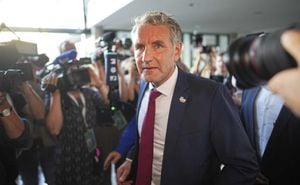President Andrzej Duda of Poland is set to meet with U.S. President Donald Trump today to discuss key issues affecting both nations, particularly the situation in Ukraine.
The meeting, scheduled for 1:30 PM local time (7:30 PM Poland time), could take place either at the White House or during the Conservative Political Action Conference (CPAC) taking place near Washington, D.C. This marks the first formal encounter between the two since Trump's inauguration and carries weight amid rising tensions due to the war in Ukraine.
Leading the Polish delegation alongside Duda will be Marcin Mastalerek, the head of the President's Cabinet; Wojciech Kolarski, the Secretary of State at the Chancellery; and Nikodem Rachoń, Deputy Head of the International Policy Bureau. Each of these figures plays strategic roles within the Polish government, with Rachoń having previously worked at the Polish Embassy in the U.S. during the Law and Justice Party's governance.
On the American side, Trump will be accompanied by Susie Wiles, his Chief of Staff; Vince Haley, Director of the Domestic Policy Council; and Mike Waltz, National Security Advisor. These individuals are instrumental players within Trump's administration, reflecting the importance the U.S. places on this meeting.
Conversations are expected to focus on strengthening the U.S.-Poland alliance, particularly about military support for Ukraine. President Duda has expressed unwavering support for Ukraine, reiteratively stating, "We consistently believe there is no other way to stop the bloodshed and achieve lasting peace in Ukraine but with the support of the United States." This statement underlines the urgency and seriousness of the discussions as Poland looks toward the U.S. for continued backing.
The scheduled meeting stands out as significant not only for the specific topics of discussion but also due to the historical relationship between the two nations. Poland has long been noted as one of the staunchest allies of the U.S. within Europe, particularly during past geopolitical tensions.
The backdrop of this meeting is shaped heavily by the global and regional security environment. With the conflict between Ukraine and Russia creating waves throughout Europe, Poland finds itself on the front lines, relying on U.S. support to bolster its defenses and influence international negotiation efforts.
Trump and Duda's previous interactions have often highlighted their mutual respect and personal rapport, something the Polish President is expected to leverage to strengthen ties beneficial for both countries. Duda’s establishment of a close relationship with the Trump administration has been seen as pivotal, influencing various bilateral agreements and engagements.
Today’s meeting was largely unanticipated, which is indicative of the dynamic nature of international politics where timelines adjust to accommodate pressing matters of state. Duda's prior conversation with Ukrainian President Volodymyr Zelensky emphasized this urgency, where Duda affirmed his belief in the necessity of U.S. involvement to mitigate the conflict.
With scheduled talks including high-profile discussions at forums such as CPAC, there's anticipation about how Duda’s visit may also spotlight broader issues affecting not only Polish and American interests but the stability of Eastern Europe as well.
Looking forward, both leaders are expected to discuss broader issues concerning NATO, defense investments, and energy independence, with the war's ramifications being of utmost importance. Such discussions are set against the backdrop of Poland’s upcoming commitments to bolster its military infrastructure and seek more substantial American presence on its soil.
The outcomes of today’s discussions between Duda and Trump could resonate well beyond the immediate topics at hand, shaping future cooperation and strategic planning aimed at maintaining peace and stability within Europe.
This meeting is positioned not only as a moment of political significance but also as one reflecting the intertwined destinies of the United States and Poland amid global challenges.
Given the historical contexts and future anticipations tied to their interactions, both nations are poised to emerge from today's talks with strengthened commitments for mutual support.



